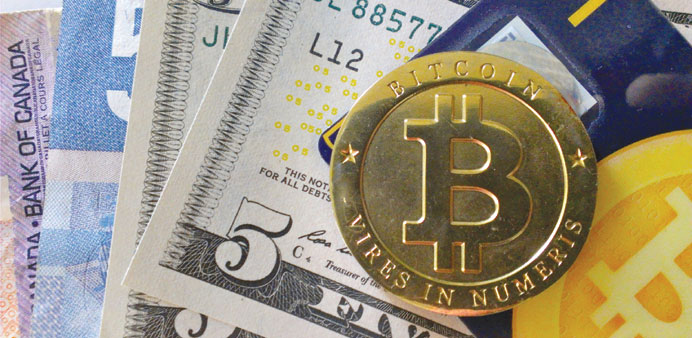Oil producing countries, particularly in the GCC, could benefit if they would use bitcoin in oil trading, instead of dollars, Markaz’ research department argues.
By Arno Maierbrugger/Gulf Times Correspondent/Bangkok
There have been a number of proposals in the past to trade oil and gas in another currency than the US dollar, for political as well as for monetary reasons. Some OPEC member states not particularly friendly to the US, whenever there was a crisis of some sort, have been making repeated noise about denominating their price for hydrocarbons in another than the US currency, but have never quite managed to agree on an alternative.
The most active countries today that pursue a no-dollars-for-oil policy are Iran, which encourages all trading partners to pay for oil in a currency other than the US dollar, and Russia, whose flagship company Gazprom, the largest extractor of natural gas in the world, recently told oil importers from China and Japan that they should pay their bills not with greenbacks, but preferably with yen, yuan or even ruble.
But a new report (Disruptive Technology: Bitcoins, Currency Reinvented?) recently issued by Kuwait-based investment banking and asset management firm Kuwait Financial Centre, also known as Markaz, even goes a step further: Oil producing countries, particularly in the GCC, could benefit if they would use bitcoin in oil trading, Markaz’ research department argues.
This comes a bit as a surprise, since bitcoin as an unregulated and — as of now — highly volatile cryptocurrency, has no manifestation other than bits and bytes stored somewhere in the virtual space and seems not to be the most reliable means of trade for the world’s most sought-after commodity. The idea is not new, though: There has been an Internet debate about one year ago on what would happen if the Opec would adopt bitcoin as transaction currency. The outcome: Firstly, the US would certainly not sit and watch the dollar losing its petrocurrency status and would do whatever needs to be done to defend the greenback; secondly, China wouldn’t allow it as it wants the yuan to be a petrocurrency as well; thirdly, in the moment oil and gas gets priced in bitcoins, it would be exposed to the cryptocurrency’s extreme volatility with massive consequences and fiscal uncertainties for petroleum-exporting countries. Speculators had a wide and anonymous field to play.
So what did Markaz actually mean? They basically said that using bitcoins would save payment transaction costs for oil exporting countries, because sending and receiving bitcoins of any denomination is just a matter of seconds and costs next to nothing. For the clearance of oil payments through conventional banks, exporting countries currently have to wait one to three days and pay the usual banking fees.
But just for saving some transaction time and costs, would the GCC, where the oil industry currently accounts for 90% of exports and 75% of government revenue, as per Markaz’ own research, really be wise to channel these massive money flows through bitcoin clearing houses, which are, as per their nature, unregulated, work with open source codes and can get — at recent history shows — easily hacked and digitally robbed? This is open for debate.
Before any barrel will ever be paid for in bitcoins, it will be the Chinese yuan that has taken on the role as the dollar’s challenger. China already pays Russia’s and Iran’s oil in yuan and is busy setting up yuan clearing houses in major financial centres all over the world to facilitate the global money flow of its currency. This is, for now, probably a much better solution until the world knows what will rally happen to bitcoin.

